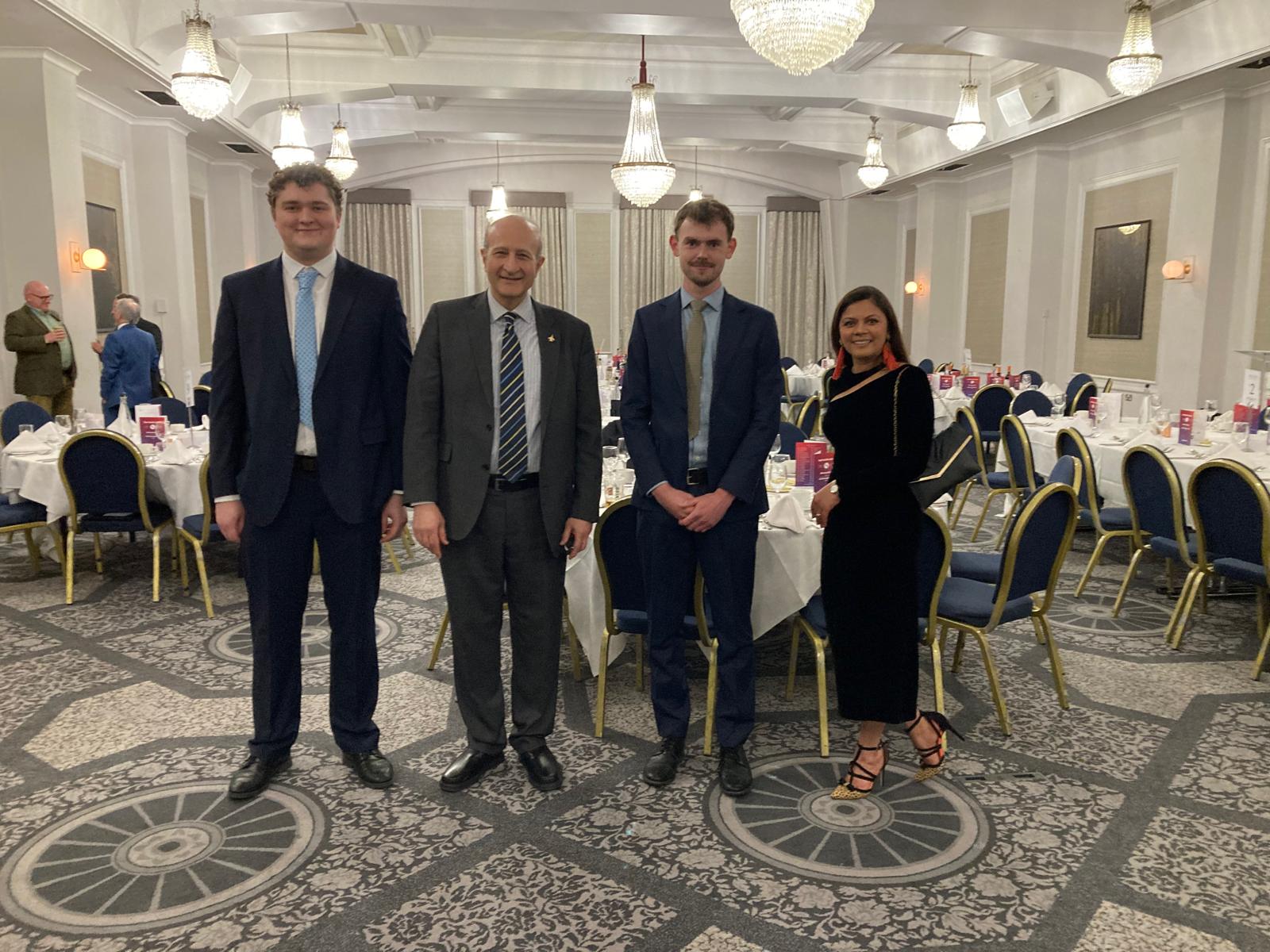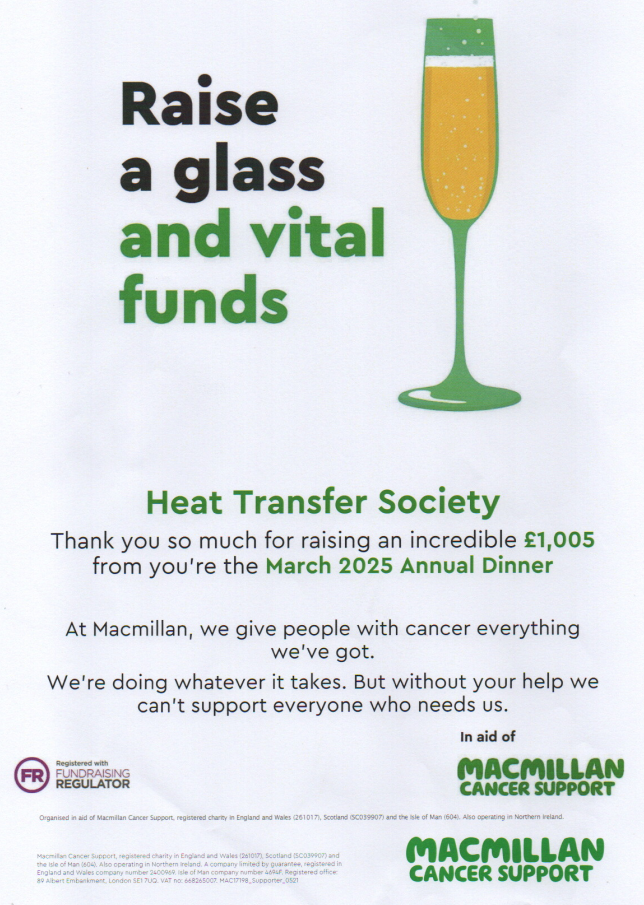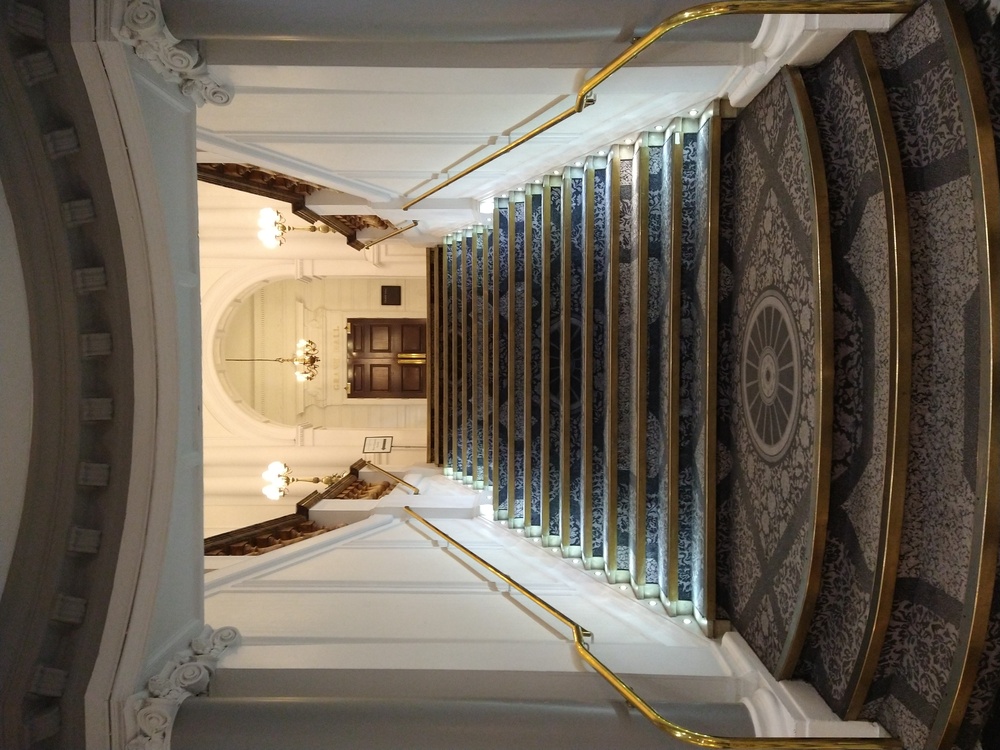On the 28th March 2025, the HTS held it's 59th HTS Annual Dinner at the Grand Connaught Rooms, London. This is the most prestigious function in our event calendar and this year, our unique learned society, celebrated it's 61st year.
Proceeding
David Norton, our society's chairman, performed master of ceremonies for the evening. He thanked everyone for attending, in particularly acknowledged the support those members who purchase a ticket as an individual. He also thanked the companies who were hosting tables; Abbey Industrial Sales, HTRI, Graham Hart Process Technology, BIH, Hexxcell, CalGavin and James Engineering
David thanked Fred Gardner, the outgoing president, for his year in office. Fred hosted his Presidents night right here in Central London.
"Brilliant work Fred"– and the society is extremely grateful for your input this year!
And so the baton passes from the world of the retired to a bloke who works for himself!
Simon Earland has been involved in the thermal and mechanical design of heat transfer equipment since the early 1970s. Working for various engineering contractors before spending 3 years at Shell Expro. A director at Finglow for 8 years before setting up his own consultancy business in 1994, providing mechanical design services to a number of fabricators. He now works on standards and training courses.
Simon joined the HTS in 1974 and his membership number is 470. He joined the committee 1980 and was Secretary from 1987 to 1989, Chair from 1995 to 1999 and Treasurer from 2002 to 2021.
President's Speech
I feel very honoured to be chosen to be President of the Heat Transfer Society. When I joined over 50 years ago it never occurred to me that I would ever become the President. I’d like to reassure you that I will not be imposing any tariffs and I have no plans for invading any countries.
I’m going to tell you a bit about my involvement with the Society and with heat transfer equipment, and to help me do that I’m going to use something that’s on the table in front of you as a guide.
Every year the Society produces a rather splendid looking menu and some of you may already have had a look to see what you were going to be eating. On the back is a list of past Presidents. You’ll be pleased to hear that I’m not going to mention them all, but I will mention some that have had an influence on my working life.
In 1965 and 1966 W P Sutherland was President. I never met him – I was still at school studying for my A levels. He was one of only two people who have been president for more than one year, or three people if you count the years when there was no HTS Dinner due to Covid.
If we go back to 1964, that is the year The Society was founded by a small group of heat transfer engineers working in London. They worked for the oil and chemical companies, contractors and manufacturers, and would meet in various pubs in London after work. They would discuss work and heat transfer problems, and started arranging technical forum presentations on a wide range of topical subjects. An executive committee was then formed with a Chairman and a President.
1964 is also important for me because it’s the year I went to see the Rolling Stones at the Richmond Jazz and Blues Festival, and that started a lifelong interest in going to see and listen to live bands. I still do it now and I still stand right down the front.
1965 was also Important for the UK for another reason – it was the year that North Sea Gas was discovered. The first gas come ashore within 18 months and the UK was self sufficient in gas in 10 years.
In 1966 I was fortunate to be offered a place at Imperial College in London to study mechanical engineering. This is where I got my first introduction to heat transfer, in thermodynamics lectures, and one of my lecturers was Professor Brian Spalding. You will see from your menu that he was President of the HTS in 1973.
There was a definite sense of optimism at this time. British industry had recovered after WW2 and was doing well. The difference in income between the highest paid and the lowest paid was the lowest it had ever been and continued to reduce until 1979 when things suddenly changed!
Imperial College was a great place to be in the 1960s. The Mechanical Engineering Building was brand new and state-of-the-art. There were lots of opportunities to go and see some great live bands, and there were the attractions of the Kings Road in Chelsea on a Saturday afternoon, Kensington Market with the distinct smell of marijuana as you walked in the door, or my girlfriend’s favourite shop – Biba on Kensington High Street.
1967 was another important year – I went to see Jimi Hendrix at the Corn Exchange in Chelmsford.
In 1970 I started work at Humphreys & Glasgow in London as a graduate trainee and 2 years later I joined the Fabricated Equipment Group where I worked on pressure vessels, shell & tube exchangers, fired heaters and reformer furnaces.
Archie Reid was the group head and he was one of the founding members of the Society (membership No 3). He became President in 1992. Hendrick Eenkhoorn was a section leader and he was another founding member (membership No 8). He became President in 1985.
Archie Reid was always keen that the young heat transfer engineers in his group should join the HTS, and he would take us along to the meetings after work. I became a member in 1974 . My membership No is 470 so you can see how much the Society had grown in 10 years. I worked with Kassem Baksh at H&G and he joined the Society at the same time as me, and is still a committee member.
In 1977 I was head hunted by Badger (the company, not the animal). I remember the interview consisted of being taken out to lunch, and being asked one question “what salary do you want?”.
I worked with Colin Weil at Badger, and he and I would both join the HTS committee a few years later. Colin was President of the Society in 2022.
I also met a guy called Brian Cashman at Badger and we would go into business together a few years later.
By 1980 Badger had run out of work so I moved on – this time to Procon (GB). It was here that I first started using the HTFS software for heat exchanger thermal design. I went to a couple of their annual meetings and met people like Geoff Hewitt and David Butterworth. Geoff was the other person who has been President twice – in 1977 and 2000. David Butterworth was President in 1988.
1980 was also the year I joined the HTS committee.
In 1983 Jerry Taborek was our President. He was the head of HTRI and our first American President.
In 1983 Procon was taken over by M W Kellogg, and suspecting that redundancy was looming I started job hunting again. I was offered a job at Shell UK Exploration & Production. This was boom time for North Sea oil and gas, and Shell had several major projects running.
I had remained friends with Brian Cashman since we worked at Badger, and in 1985 he asked me if I would join him as a director of a company he had just started. He was writing software for the mechanical design of pressure vessels and heat exchangers. The company was called Finglow – you may have heard of it. Although it initially meant a significant reduction in income I thought it sounded interesting, and it actually worked out rather well.
Brian had begun writing the software on a Sinclair ZX81 (anyone remember them?), but the introduction of the IBM PC changed everything. It now became acceptable to have a PC in the office – all you needed was some software to run on it, and that came on a 5¼ inch floppy disc with a memory capacity of a whopping 360 kB.
In 1986 the IMechE Pressure Systems Group, in conjunction with the University of Strathclyde, ran a course on Pressure Vessel Design using BS 5500. Brian and I got ourselves invited to go and demonstrate the Finglow software, and it was there that I met a young post graduate engineer by the name of David Nash (now Professor Nash). I’m pleased to see him here tonight on the Graham Hart table.
Although the course was very good and all the speakers were people who had actually written various parts of BS 5500, it was very theoretical. David and I both thought there was a need for a more practical course showing how to actually design pressure vessels, so we agreed to start developing one.
In 1988 we ran the first course at the University of Strathclyde, and we have been running it pretty much every year since then, together with other courses we have developed for ASME VIII and EN 13445.
I also met various influential people who were members of the IMechE Pressure Systems Group Board and various BSI committees.
In 1987 I was elected as Secretary of the HTS when Nigel Smith was Chair and Jeff Neville was President.
In 1990 I was invited to become a member of the BSI PVE/1/15 committee which looks after the design section of PD 5500. I am still a member of the committee, David Nash is the Chair and the Committee Manger is Sarah Kelly, also here tonight on the Graham Hart table.
In 1992 I was invited to join the IMechE Pressure Systems Group Board, and I am still a member of that too
In January 1994 I decided to leave Finglow and set up my own consultancy business designing pressure vessels and heat exchangers for various manufacturers. There have been some good years and some bad years, but I have really enjoyed working for myself.
In 1995 I was elected as Chair of the HTS, and at my first Annual Dinner as Chair I had the pleasure of inaugurating Mike Morris of BP as President. I worked with Mike on the PVE/1/15 committee and I had a lot of respect for him and his knowledge of the Code.
In 1996 Keith Mangnall of Hick, Hargreaves & Company in Bolton became President, and it was he who introduced The Balls. These Chinese exercise balls were acquired by Keith while visiting China on business. He noticed that the Yin and Yang symbol on the balls had some similarity to the HTS logo, so he bought some. At the Annual Dinner in 1997 Keith presented The Balls to the new President, Dr Reg Bott, and the tradition has continued to this day.
The balls are hollow and contain a sounding plate. One ball produces a high tone and the other produces a low tone. It is claimed that the balls have the ability to enhance the user’s health and well-being, so I am looking forward to that.
According to Wikipedia, Yin and Yang is a concept that originated in Chinese philosophy, describing opposite but interconnected, self-perpetuating cycles. Yin and Yang can be thought of as complementary (rather than opposing) forces that interact to form a dynamic system in which the whole is greater than the assembled parts.
In 1998 David Bate was inaugurated as President, and in 1999, my last year as Chair, Tom Mowbray of Motherwell Bridge was President.
2000 was the second year that Prof. Geoff Hewitt was President. Many of the presidents from 2001 onwards are people I have either worked with or have served with on the HTS committee.
You may have noticed that there is a mixture of people from manufacturing, contracting, end users, academia and research – this is a deliberate policy by the HTS committee.
In 2002 I was elected as Treasurer of the Society and I held that post until 2021.
In 2003, David Nash and I, together with welding engineer Bill Garden, had a book published – a Guide to European Pressure Equipment. You can still buy it on Amazon for a mere £496.66, that’s with 15% off! I would strongly recommend that you don’t waste your money on it. It does contain some useful information, but it’s ridiculously overpriced and David and I don’t get any royalty fees.
In 2004 I took over from Mike Morris as the Pressure Vessel Consultant to the BSI PVE committees, and I am still doing that job.
In 2009 the Society inaugurated its first female President – Claudette Beyer of HTRI.
In 2010 I became involved in European Standards and joined the CEN TC54 Working Group 53 which is responsible for EN 13445 Part 3, the design part of the European Pressure Vessel standard.
In 2016 I was awarded the Donald Julius Groen Prize by the Pressure Systems Group at the IMechE. I considered it a great honour to be awarded the prize by a group of people that I admired and respected.
In 2017 I became Convenor of CEN TC54 Working Group 7 when the previous Convenor, Dave Smith, passed away. WG7 was developing a new part of EN 13445 for titanium and this was finally published last year.
In 2019 I started to wind down the design consultancy work I was doing and now I just do the standards work and training courses. I don’t play golf and I hate gardening, so it gives me something to do with my time.
You will see from your menu that there was no new president inaugurated in 2020 or 2021 – this was due to the Covid restrictions.
2021 was my last year as Treasurer of the HTS and I handed the cheque book over to Russell Skinner.
I hope you haven’t been too bored by my reminiscences of the last 60 years.
Society Report, Awards and Thanks
The Society held two forums events and an AGM over Teams. We attended and our members presented at the UK National Heat Transfer Conference, UKNHTC, held at Birmingham University – bringing your society closer to academia. At this event, the Society awarded the 2024 HTS Award for the best Undergraduate & MSc Heat Transfer Thesis – which was won by a collective from Leeds University entitled "COMPUTER-ENABLED OPTIMISATION OF A HEAT EXCHANGER FOR PREHEATING HYDROGEN IN FUTURE AEROSPACE PROPULSION SYSTEMS". Unfortunately, the Academic Supervisor Professor Harvey Thompson is unable to join. But we are delighted that the Industry Supervisor; Professor Shapar is with us this evening, together with Jack Wilson, one of the collective.

Student award winners from left Jack Wilson, Professor Shahrokh Shahpar Rolls Royce (Industrial supervisor) and Antony Hodgson. Also featuring Hezlin Askraf - HTS Committee Member
Earlier today we held a highly successful, one day conference, jointly with the IChemE’s Fluid Separations Special Interest Group at UCL, London, on the subject of Carbon Capture, Hydrogen, and Ammonia Technologies.
We have had a changing of the guard on the committee. Mike Moore and Dave Evans have retired as Trustees and I am pleased to welcome Ian Gibbard and Chris Hart as new Society Trustees along with Tim Griffin.
Also, a few members of the committee called it a day and I wish to thank David Gibbons, Peter Vannan and Phil Siggery for their support and wish them well for the future.
I would also like to thank the society’s committee for their continuing efforts during this past year.
Special thanks go to:
Tim Griffin - Membership
Chris Hart - Website
Russell Skinner - Treasurer
Simon Parsons – Forums and Dinner and the one day conference held earlier today
Hezlin Askraf – for being the sub-committee chair for the UKNHTC event.
The Mike Ackrill Trophy is awarded to the best Forum of the year. There were two contenders this years:
- In June, Michael Radicone – Speciality Product Lead for HTRI, gave a presentation entitled "The Science, Creation and Environmental Impact of Vapour Infusion Nano Bubbles."
- In Nov, Andrew Wills – MD and founder of Process Technology Strategic Consultancy, gave a presentation entitled "How to Achieve a 300% improvement in heat transfer and productivity in Chemical Batch Reactors."
The Committee and Members who attended the AGM reviewed and voted for their favourite with the unanimous winner being Michael Radicone of HTRI. Simon Earland presented Hans Zettler of HTRI the Trophy on Michael’s behalf
Stand Up Bingo
Last year we raised £1000 for UNICEF. This years charity fundraising event has been sponsored by BIH and their chosen charity is MacMillan Cancer Support. MacMillan, supporting over 3m people in the UK living with Cancer – your donations will make a real difference.
We are pleased to announce that we raised £1005 and received the following in appreciation from MacMillan Cancer Support.



